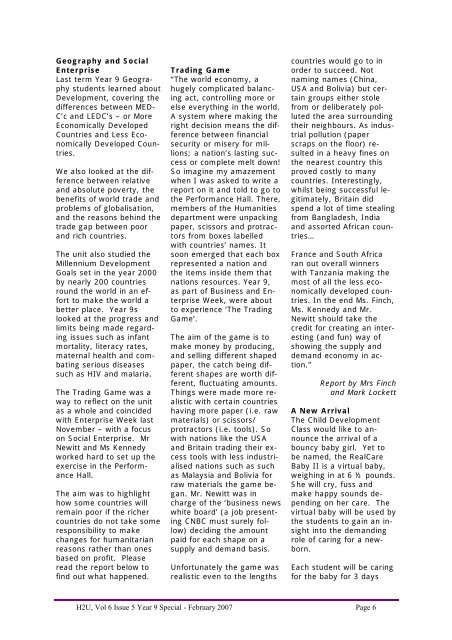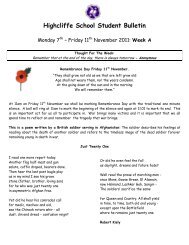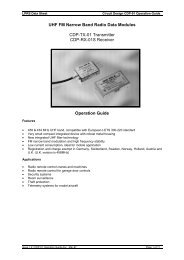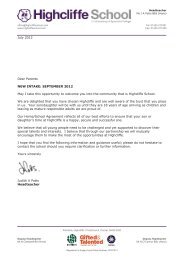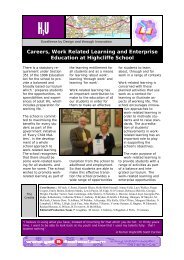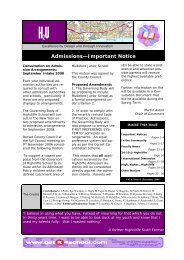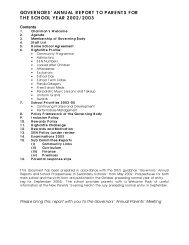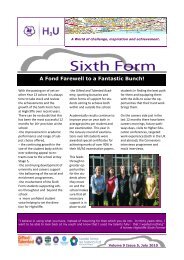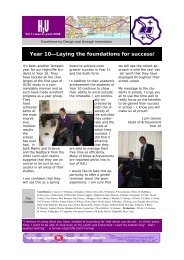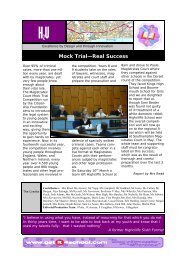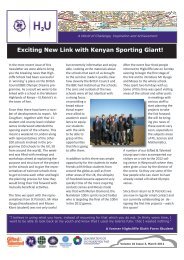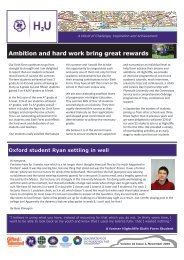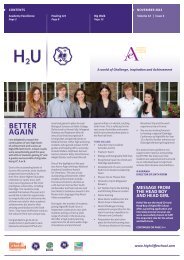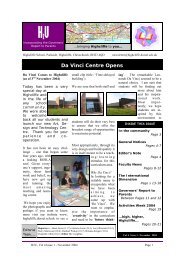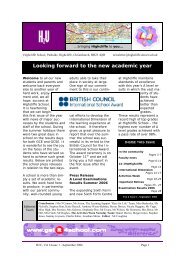H2U Vol 6 Issue 5 Year 9 Special.pub - Highcliffe School
H2U Vol 6 Issue 5 Year 9 Special.pub - Highcliffe School
H2U Vol 6 Issue 5 Year 9 Special.pub - Highcliffe School
You also want an ePaper? Increase the reach of your titles
YUMPU automatically turns print PDFs into web optimized ePapers that Google loves.
Geography and Social<br />
Enterprise<br />
Last term <strong>Year</strong> 9 Geography<br />
students learned about<br />
Development, covering the<br />
differences between MED-<br />
C’c and LEDC’s – or More<br />
Economically Developed<br />
Countries and Less Economically<br />
Developed Countries.<br />
We also looked at the difference<br />
between relative<br />
and absolute poverty, the<br />
benefits of world trade and<br />
problems of globalisation,<br />
and the reasons behind the<br />
trade gap between poor<br />
and rich countries.<br />
The unit also studied the<br />
Millennium Development<br />
Goals set in the year 2000<br />
by nearly 200 countries<br />
round the world in an effort<br />
to make the world a<br />
better place. <strong>Year</strong> 9s<br />
looked at the progress and<br />
limits being made regarding<br />
issues such as infant<br />
mortality, literacy rates,<br />
maternal health and combating<br />
serious diseases<br />
such as HIV and malaria.<br />
The Trading Game was a<br />
way to reflect on the unit<br />
as a whole and coincided<br />
with Enterprise Week last<br />
November – with a focus<br />
on Social Enterprise. Mr<br />
Newitt and Ms Kennedy<br />
worked hard to set up the<br />
exercise in the Performance<br />
Hall.<br />
The aim was to highlight<br />
how some countries will<br />
remain poor if the richer<br />
countries do not take some<br />
responsibility to make<br />
changes for humanitarian<br />
reasons rather than ones<br />
based on profit. Please<br />
read the report below to<br />
find out what happened.<br />
Trading Game<br />
“The world economy, a<br />
hugely complicated balancing<br />
act, controlling more or<br />
else everything in the world.<br />
A system where making the<br />
right decision means the difference<br />
between financial<br />
security or misery for millions;<br />
a nation’s lasting success<br />
or complete melt down!<br />
So imagine my amazement<br />
when I was asked to write a<br />
report on it and told to go to<br />
the Performance Hall. There,<br />
members of the Humanities<br />
department were unpacking<br />
paper, scissors and protractors<br />
from boxes labelled<br />
with countries’ names. It<br />
soon emerged that each box<br />
represented a nation and<br />
the items inside them that<br />
nations resources. <strong>Year</strong> 9,<br />
as part of Business and Enterprise<br />
Week, were about<br />
to experience ‘The Trading<br />
Game’.<br />
The aim of the game is to<br />
make money by producing,<br />
and selling different shaped<br />
paper, the catch being different<br />
shapes are worth different,<br />
fluctuating amounts.<br />
Things were made more realistic<br />
with certain countries<br />
having more paper (i.e. raw<br />
materials) or scissors/<br />
protractors (i.e. tools). So<br />
with nations like the USA<br />
and Britain trading their excess<br />
tools with less industrialised<br />
nations such as such<br />
as Malaysia and Bolivia for<br />
raw materials the game began.<br />
Mr. Newitt was in<br />
charge of the ‘business news<br />
white board’ (a job presenting<br />
CNBC must surely follow)<br />
deciding the amount<br />
paid for each shape on a<br />
supply and demand basis.<br />
Unfortunately the game was<br />
realistic even to the lengths<br />
countries would go to in<br />
order to succeed. Not<br />
naming names (China,<br />
USA and Bolivia) but certain<br />
groups either stole<br />
from or deliberately polluted<br />
the area surrounding<br />
their neighbours. As industrial<br />
pollution (paper<br />
scraps on the floor) resulted<br />
in a heavy fines on<br />
the nearest country this<br />
proved costly to many<br />
countries. Interestingly,<br />
whilst being successful legitimately,<br />
Britain did<br />
spend a lot of time stealing<br />
from Bangladesh, India<br />
and assorted African countries…<br />
France and South Africa<br />
ran out overall winners<br />
with Tanzania making the<br />
most of all the less economically<br />
developed countries.<br />
In the end Ms. Finch,<br />
Ms. Kennedy and Mr.<br />
Newitt should take the<br />
credit for creating an interesting<br />
(and fun) way of<br />
showing the supply and<br />
demand economy in action.”<br />
Report by Mrs Finch<br />
and Mark Lockett<br />
A New Arrival<br />
The Child Development<br />
Class would like to announce<br />
the arrival of a<br />
bouncy baby girl. Yet to<br />
be named, the RealCare<br />
Baby II is a virtual baby,<br />
weighing in at 6 ½ pounds.<br />
She will cry, fuss and<br />
make happy sounds depending<br />
on her care. The<br />
virtual baby will be used by<br />
the students to gain an insight<br />
into the demanding<br />
role of caring for a newborn.<br />
Each student will be caring<br />
for the baby for 3 days<br />
<strong>H2U</strong>, <strong>Vol</strong> 6 <strong>Issue</strong> 5 <strong>Year</strong> 9 <strong>Special</strong> - February 2007 Page 6


